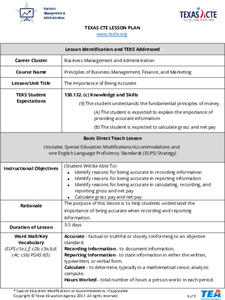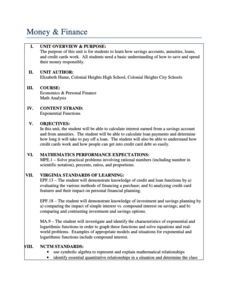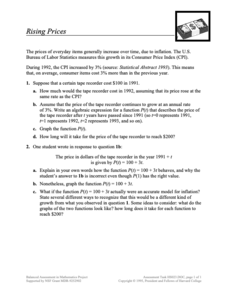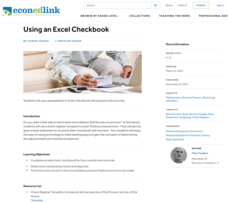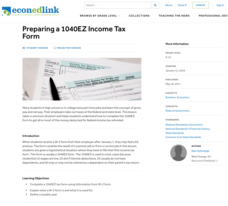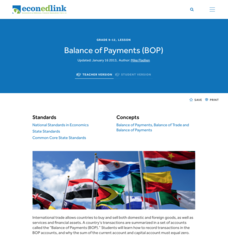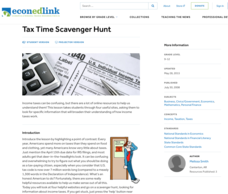K20 LEARN
Identity Theft: Don't Let This Happen to Your Grandma!
Class members consider how people steal online identities as they discover the essential elements of identity theft and consumer fraud. Pupils demonstrate learning by creating a poster or video about how to avoid identity theft.
Texas Education Agency (TEA)
Importance of Being Accurate
Accuracy is key! Using the detailed resource, scholars practice their presicion skills, taking online spelling and typing tests. Next, they demonstrate accuracy by calculating the gross and net pay of five hypothetical employees.
California Department of Education
California CareerZone Make Money Choices Student Workbook
An activity challenges scholars to make smart money choices. While visiting the California CareerZone website, pupils choose between budgeting for one's lifestyle or salary and complete a two-page instructional activity based on the...
Texas Education Agency (TEA)
Creating a Lifestyle Budget
Using the practical resource, pupils view a PowerPoint and complete a KWL chart to learn all about budgeting. To finish, they create a budget based on their projected lifestyle profiles.
US Department of Commerce
Where to Next?
Salary, education, census statistics ... how do people choose their careers? Scholars complete worksheets and rely on census data to determine their career aspirations. Then, pupils conduct Internet research about places they would...
Radford University
Money and Finance
Make the connection between money and exponential equations. Pupils continue financial lessons as they learn about compound interest in savings accounts. They extend the investigation of savings by looking at annuities, and then...
Radford University
Percentages: Lessons 2 and 3
What does salary have to do with it? Working in small groups, scholars use percentages to find simple interest and the value of a car they can afford on a given salary. Learners continue on to work with salaries and calculate amounts...
Concord Consortium
Rule of 72
Find an easier way to double it. Using the price of an item and the Consumer Price Index, learners determine how long it will be for the price to double. Scholars calculate the length of time it would take for the price to double using a...
Concord Consortium
Rising Prices
What will that cost in the future? The scenario provides pupils with a growth as a Consumer Price Index. Learners create functions for a given item to determine future prices and graph them. Class members then compare their functions to...
Insurance Zebra
Insurance Curriculum for Middle and High School Teachers
Liability, deductible, premium ... what do these words mean, and how do they relate to insurance? Scholars complete a pre-test, matching vocabulary activity, and insurance timeline worksheet and become familiar with these terms. Next,...
Council for Economic Education
Calculating Simple Interest
How much is owed? A calculated resource introduces the simple interest formula with a video that describes how to use it. Classmates then show what they know by answering questions within a simple interest worksheet.
Concord Consortium
It's In the Mail
It's time to check the mail! The task is to determine the most cost-effective way to mail a packet of information. Young scholars write an equation that models the amount of postage as a function of the number of sheets mailed and...
Council for Economic Education
Understanding a Balance Sheet
Read any financial website or book, and it is bound to discuss the words asset and liability. But what do these words actually mean to the class? The resource effectively explains by using multiple formats and techniques, including...
Council for Economic Education
Using an Excel Checkbook
High school is the time that many scholars get their first jobs. Help young entrepreneurs apply economic principles to crucial skills for their new jobs and for functioning in society in general. They use Excel to balance a checkbook by...
Council for Economic Education
Preparing a 1040EZ Income Tax Form
Some of us never feel like we know how to do our taxes! Help scholars understand the process early by using an informative resource. They fill out their own tax forms in a simulation activity and view multiple resources to learn even...
PBS
Taxes—Where Does Your Money Go?
People spend some of their money before they even get it! Lead a lesson that helps scholars understand the different deductions taken from a paycheck. They calculate rates and percentages and learn where the money goes after it leaves...
California Department of Education
College: Plan Well and Pay Less
They say you gotta pay to play, and postsecondary education is no exception! High schoolers learn how to research and analyze the cost of postsecondary education as well as the different ways to pay for schooling. Learners then work...
Council for Economic Education
A Penny Saved
A penny saved is a penny earned! Scholars research the different ways to save money over a lifetime. They investigate the Rule of 72, compound interest, and sub-prime loans to gain an understanding of how banks aid in the saving process....
Council for Economic Education
Balance of Payments (BOP)
Have you ever checked your clothes to see how many nations created them? Pupils take a deeper look at international trade and the balance of payments nations have with one another. They use calculations, simulations, and primary sources...
Council for Economic Education
Tax Time Scavenger Hunt
Is a 1040EZ tax form really easy? Scholars investigate the complexities of the United States taxation system with an economics lesson. Using a wide variety of web sources, they interpret IRS taxation rules and regulations to better...
Council for Economic Education
Banks and Credit Unions (Part 1)
Imagine you have money you want to save ... where do you put it? Pupils investigate the similarities and differences of banks and credit unions as they determine where exactly to place their hard-earned money. Through a WebQuest, they...
Council for Economic Education
Loan Amortization - Mortgage
When you buy a home for $100,000, you pay $100,000—right? On the list of important things for individuals to understand, the lesson presents the concept of interest rates and loan amortization using spreadsheets and online sources....
Council for Economic Education
Opportunity Cost
The price of those new shoes involves more than just money! Individuals explore the concept of opportunity cost using a video clip and gratification discussions. They prepare a budget based off of their set of values in regards to...
101 Questions
What Micheal’s Coupon Should You Use?
Get your classes on their way to extreme couponing! Young mathematicians analyze two different coupon options for the better deal. They use different scenarios to predict and compare the outcomes.



